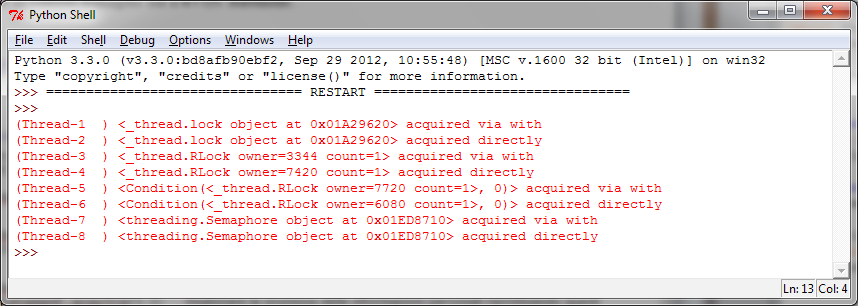Python并行编程
- 本书说明
- 1 认识并行计算和Python
- 1.1 介绍
- 1.2 并行计算的内存架构
- 1.3 内存管理
- 1.4 并行编程模型
- 1.5 如何设计一个并行程序
- 1.6 如何评估并行程序的性能
- 1.7 介绍Python
- 1.8 并行世界的Python
- 1.9 介绍线程和进程
- 1.10 开始在Python中使用进程
- 1.11 开始在Python中使用线程
- 2 基于线程的并行
- 2.1 介绍
- 2.2 使用Python的线程模块
- 2.3 如何定义一个线程
- 2.4 如何确定当前的线程
- 2.5 如何实现一个线程
- 2.6 使用Lock进行线程同步
- 2.7 使用RLock进行线程同步
- 2.8 使用信号量进行线程同步
- 2.9 使用条件进行线程同步
- 2.10 使用事件进行线程同步
- 2.11 使用with语法
- 2.12 使用 queue 进行线程通信
- 2.13 评估多线程应用的性能
- 3 基于进程的并行
- 3.1 介绍
- 3.2 如何产生一个进程
- 3.3 如何为一个进程命名
- 3.4 如何在后台运行一个进程
- 3.5 如何杀掉一个进程
- 3.6 如何在子类中使用进程
- 3.7 如何在进程之间交换对象
- 3.8 进程如何同步
- 3.9 如何在进程之间管理状态
- 3.10 如何使用进程池
- 3.11 使用Python的mpi4py模块
- 3.12 点对点通讯
- 3.13 避免死锁问题
- 3.14 集体通讯:使用broadcast通讯
- 3.15 集体通讯:使用scatter通讯
- 3.16 集体通讯:使用gather通讯
- 3.17 使用Alltoall通讯
- 3.18 简化操作
- 3.19 如何优化通讯
- 4 异步编程
- 4.1 介绍
- 4.2 使用Python的 concurrent.futures 模块
- 4.3 使用Asyncio管理事件循环
- 4.4 使用Asyncio管理协程
- 4.5 使用Asyncio控制任务
- 4.6 使用Asyncio和Futures
- 5 分布式Python编程
- 5.1 介绍
- 5.2 使用Celery实现分布式任务
- 5.3 如何使用Celery创建任务
- 5.4 使用SCOOP进行科学计算
- 5.5 通过 SCOOP 使用 map 函数
- 5.6 使用Pyro4进行远程方法调用
- 5.7 使用 Pyro4 链接对象
- 5.8 使用Pyro4部署客户端-服务器应用
- 5.9 PyCSP和通信顺序进程
- 5.10 使用Disco进行MapReduce
- 5.11 使用RPyC远程调用
- 6 Python GPU编程
使用with语法
Python从2.5版本开始引入了 with
语法。此语法非常实用,在有两个相关的操作需要在一部分代码块前后分别执行的时候,可以使用
with 语法自动完成。同事,使用 with
语法可以在特定的地方分配和释放资源,因此, with
语法也叫做"上下文管理器"。在threading模块中,所有带有 acquire() 方法和
release() 方法的对象都可以使用上下文管理器。
也就是说,下面的对象可以使用 with 语法:
- Lock
- RLock
- Condition
- Semaphore
在本节中,我们将使用 with 语法简单地尝试这四个对象。
下面的例子展示了 with
语法的基本用法,我们有一系列的同步原语,下面尝试用 with 来使用它们: :
import threading
import logging
logging.basicConfig(level=logging.DEBUG, format='(%(threadName)-10s) %(message)s',)
def threading_with(statement):
with statement:
logging.debug('%s acquired via with' % statement)
def threading_not_with(statement):
statement.acquire()
try:
logging.debug('%s acquired directly' % statement )
finally:
statement.release()
if __name__ == '__main__':
# let's create a test battery
lock = threading.Lock()
rlock = threading.RLock()
condition = threading.Condition()
mutex = threading.Semaphore(1)
threading_synchronization_list = [lock, rlock, condition, mutex]
# in the for cycle we call the threading_with e threading_no_with function
for statement in threading_synchronization_list :
t1 = threading.Thread(target=threading_with, args=(statement,))
t2 = threading.Thread(target=threading_not_with, args=(statement,))
t1.start()
t2.start()
t1.join()
t2.join()下图展示了使用 with 的每一个函数以及用在了什么地方:

在主程序中,我们定义了一个list, threading_synchronization_list
,包含要测试的线程同步使用的对象: :
lock = threading.Lock()
rlock = threading.RLock()
condition = threading.Condition()
mutex = threading.Semaphore(1)
threading_synchronization_list = [lock, rlock, condition, mutex]定义之后,我们可以在 for 循环中测试每一个对象: :
for statement in threading_synchronization_list :
t1 = threading.Thread(target=threading_with, args=(statement,))
t2 = threading.Thread(target=threading_not_with, args=(statement,))最后,我们有两个目标函数,其中 threading_with 测试了 with 语法: :
def threading_with(statement):
with statement:
logging.debug('%s acquired via with' % statement)在本例中,我们使用了Python的logging模块进行输出: :
logging.basicConfig(level=logging.DEBUG, format='(%(threadName)-10s) %(message)s',)使用 % (threadName)
可以在每次输出的信息都加上线程的名字。logging模块是线程安全的。这样我们可以区分出不同线程的输出。
译者注:译者在博客上写过一篇有关Python的with语句的文章,可以参考一下:https://www.kawabangga.com/posts/2010